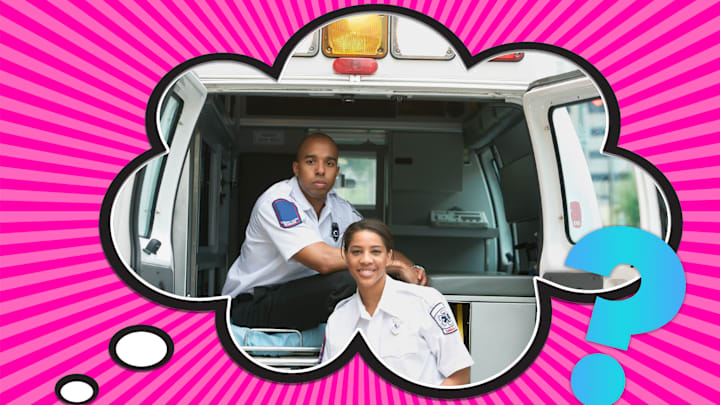The healthcare workers who respond to your emergency might very well be paramedics, EMTs, EMRs, or some of each. But the terms aren’t interchangeable synonyms that just mean “any first responder who arrives in an ambulance.”
Basically, there’s a hierarchy of positions in emergency medical services (EMS). The higher up you climb, the more duties you’re allowed to perform—and the more education you’ll have to undergo to get certified. At entry level are emergency medical responders (EMRs), a certification that typically requires around 60 hours of training. As the National Registry of Emergency Medical Technicians explains, EMRs can “provide immediate lifesaving care to critical patients.” This may include tasks like administering CPR and bag-valve-mask ventilation, assessing trauma, taking vital signs, assembling splints, and responding to patients experiencing shock or diabetic emergencies.
The next major category is emergency medical technicians, or EMTs, whose training program lasts roughly 150 hours or longer. These professionals can do everything EMRs can do, plus more: delivering babies, dealing with fire-related injuries or exposure to hazardous materials, etc. You don’t usually need an EMR certification—or, in fact, any previous medical experience—to enroll in an EMT program. But if you want to become a paramedic, you’ll likely first need to get certified as an EMT.
Paramedics are at the top of the hierarchy, and they probably spent somewhere between 1200 to 1800 hours in training to get there. In addition to the capabilities of EMS workers under them, paramedics can also do things like interpret EKGs, intubate patients, and administer intravenous medications.
The exact duties and training requirements for these positions can vary by state. And there are also jobs that fall between the big three covered above—like “advanced EMTs.” So if you see a non-paramedic first responder giving someone an IV, it doesn’t mean they’re punching above their weight class.
Have you got a Big Question you'd like us to answer? If so, let us know by emailing us at bigquestions@mentalfloss.com.
